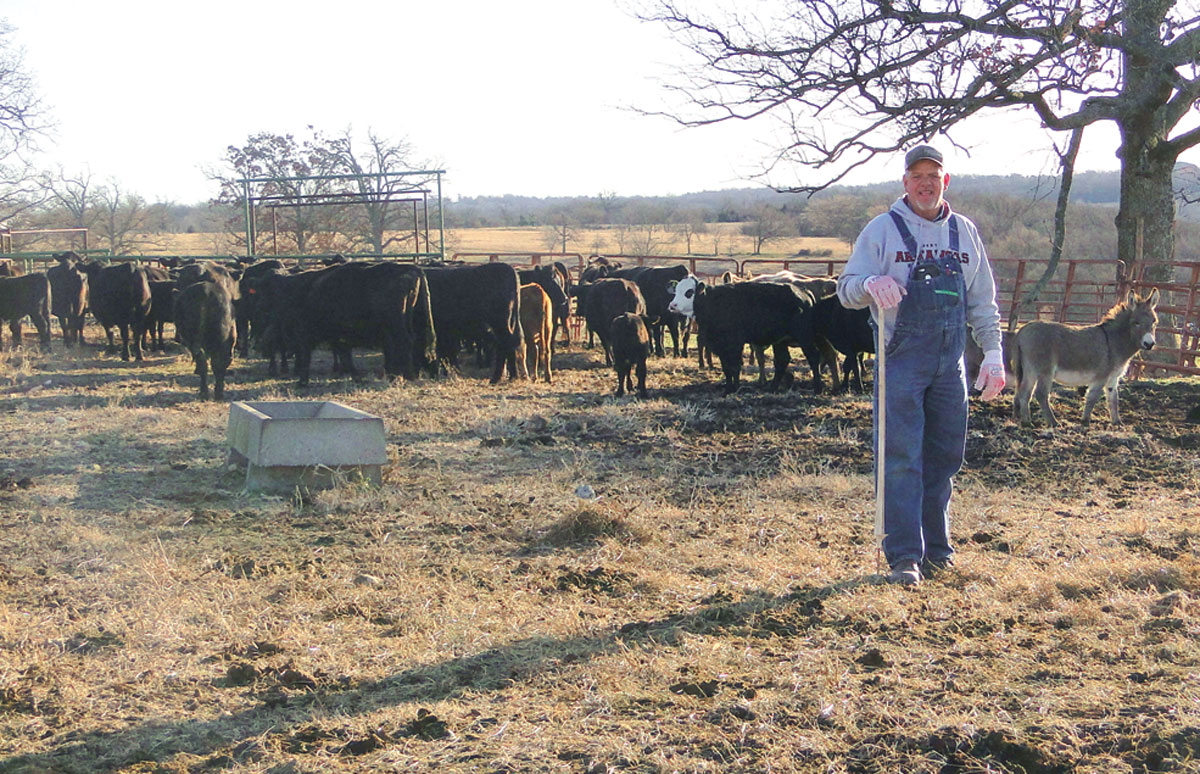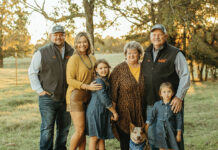
Willie Leming struck out on his own at a young age and followed his farming roots
Willie and Kim Leming of Evansville, Ark., own 320 acres on three farms in Evansville, Dutch Mills and Lincoln, Ark., with their son Dakota living on the farm in Lincoln and working with his dad in a variety of enterprises.
Meanwhile Kim has worked for Ozark Electric for 32 years as an operations clerk and wants to retire but they are very reluctant to let her go.
Willie and Kim also have two daughters, Ashley and Amber, and eight grandchildren, aged from 10 months to 19 years old.
Because Willie lost his father when he was 10, he understands on a very personal level what being a father and supporting a family means.
The backbone of this country has always been people like Willie who find a way to make life work.
“Mom worked at Campbell Soup and couldn’t afford to feed one much less five so I went out on my own when I was 12,” explained Willie.
A neighbor named Gary Carter took the young boy in. The two worked side-by-side doing all of the things that were necessary to make a farm function in exchange for room and board. In today’s world we would call that an internship but back then it was simply survival.
When Willie was 15, he worked for Dick Latta, who had dairy and commercial cows as well as poultry and Latta Steel Trusses, Inc. The farm work Willie did reflects back to his earliest memories of going with his dad to drive a tractor once he was out of diapers and bottle feeding a calf when he was three or four.
“I’ve got more miles driving farm equipment than a truck,” Willie said with a smile and a laugh.
Willie worked hard, saved money and started farming with 5 acres and 23 dairy bottle calves while he worked cleaning out chicken houses for Mike Traylor. Because cars were too expensive at that time, so he road a 125cc Sears motorcycle. Eventually, Willie worked for the state highway department and then Lincoln’s fire department where he has served as chief for 15 years.
The variety in Willie’s background led him to pursue a diversified income, which now includes chickens and cattle, Leming and Son Construction, Willie’s Wrecker Service, Inc., and Leming and Son Trucking, which ships dry freight, equipment, heavy equipment, tires and a variety of other products in box trucks and on flatbeds.
“When you live in a small community, you can’t put all your eggs in one basket’s so I have a little bit of everything,” explained Willie.
Willie’s truest passion, however, is farming. His farm in Lincoln is home to four broiler houses. He raises chickens to 7 pounds and has to sell most of his litter since much of his land is near two watersheds with highly restrictive regulations on litter usage. That means he fertilizes his pastures only when needed and in compliance with all regulations.
Like so many farmers, thistles are his biggest weed issue, and he broadcast sprays only if conditions demand it. Pasture composition is a combination of clover, fescue and Bermuda though he also has some winter wheat. Water on the three farms is supplied by ponds and springs with Willie considering using an NRCS program to get tire waterers on the Evansville property which had been Kim’s family farm.
Willie recently bought 70 synchronized bred black baldie heifers that were due to have calves in February, which he subsequently wants to breed to the Hereford bulls in order to increase body carcass. With this group, he plans to maintain fall calving by putting the bulls back with the black baldies in May. In addition to those heifers, Willie has 130 mostly Angus mommas and an additional four Angus cross bulls. The bulls are kept with the cows year round.
“Just like an empty chicken house makes no money, neither does an unbred cow. I want them popping out babies all the time,” Willie said.
Willie prefers to keep his calves until they are ready for the feedlot when he sells them at a sale barn. His winter feeding regimen includes a 4-pound ration of 14 percent protein per calf per day, in addition to silage hay, dry hay and minerals and tub minerals to help with digestion health for that diet. In spring he changes his minerals to accommodate digestive health with the greener grasses, a major component of spring and summer feeding. Willie maintains a regular vaccination protocol and worms three times a year using a combination of injection and pour on. The cattle are checked daily in order to maintain optimum health and growth.
“I heard a graduation speech once where the speaker said that you have to do what you’ve always done and get what you’ve always got in order to be successful,” Willie said. “I believe that and have always tried to follow that advice.”
Willie also believes in community service and will soon give up his position of vice president of the Arkansas Cattlemen’s Association in order to be the Washington County District 13 Justice of the Peace, a position he plans to use to improve his community with roads being a special interest. He is also a member of Summers Missionary Baptist Church.
Willie’s goal is to begin the process of stepping back from his excessive and diverse responsibilities in order to be a full-time farmer.
“All retirement means to me is that I’m going to die on the farm,” Willie said with a smile.






